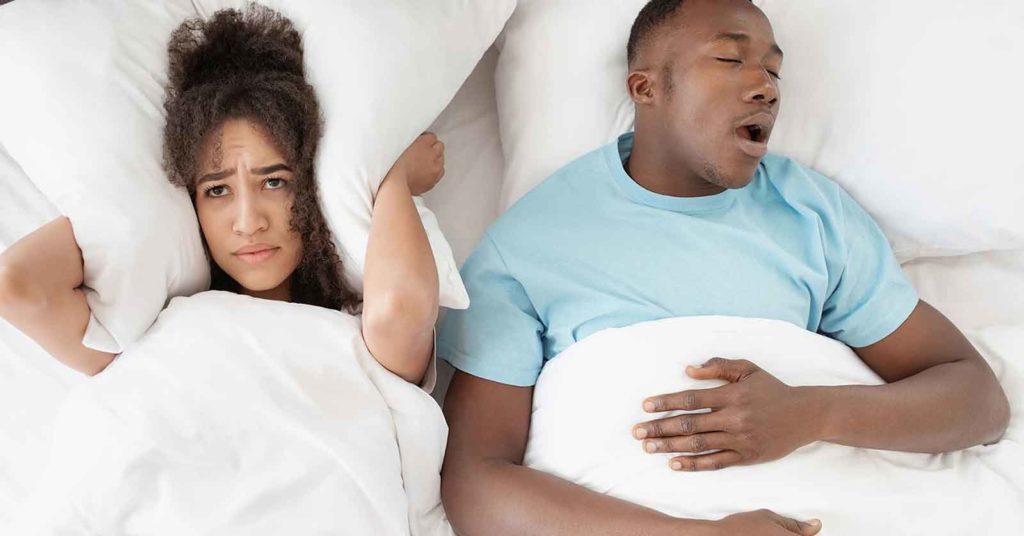
Sleep is essential for existence. Sleep helps the body recover mentally and physically, allowing the brain and the body the rest it deserves at the end of a long day. Contrary to popular belief, naps are not recommended as it is detrimental to sleep hygiene. Though the required amount of sleep can vary from person to person, most humans spend 25-35% of their lives in slumber. (Mathew, 2020) A good night’s sleep is easier when you or the people around you do not snore. However, snoring could be a part of a bigger problem.
Types of Sleep Apnea
Sleep apnea is a serious sleep disorder that affects your breathing, often leading to snoring loudly and feeling tired even after a full night’s sleep. There are three types of Sleep Apnea that affect humans
Obstructive Sleep Apnea, where the throat muscles relax
Central Sleep Apnea, where the brain does not send proper signals to the organs that control breathing
Complex Sleep Apnea Syndrome, where a person suffers from both, obstructive sleep apnea and central sleep apnea (Mayo Clinic Staff, 2020)
Risks of Sleep Apnea
Sleep apnea does not only affect your sleep but can also increase the risk for other health issues like
High Blood Pressure
Waking up multiple times in the night leads to more stress, which in turn increases your blood pressure levels. The levels of oxygen in the blood also drop because of not breathing well, which affects your blood pressure. If you already have high blood pressure, sleep apnea can add to it. (WebMD, 2020)
Obesity
Weight gain and sleep apnea are correlated. Weight gain can increase the chances of getting sleep apnea and at the same time, sleep apnea makes it harder to lose the extra weight. Obesity can lead to several health risks. (Mayo Clinic Staff, 2020)
Heart Disease
Sleep apnea increases your risk of recurrent heart attacks, strokes, and abnormal heartbeats. The changes in blood pressure also put a strain on the cardiovascular system. In the case of existing heart disease, sleep apnea can lead to sudden death from an irregular heartbeat. (Mayo Clinic Staff, 2020)
Type 2 Diabetes
Sleep Apnea is highly common among people with Type 2 diabetes. More than 80% of the people suffering from Type 2 diabetes have Obstructive Sleep Apnea. There are no studies that link these two, but less sleep can lead to your body not using insulin properly, which can cause Diabetes. (WebMD, 2020)
Liver Problems
People with sleep apnea are more likely to have abnormally functioning livers with more chances of showing scarring and having a fatty liver. (Mayo Clinic Staff, 2020)
As per studies, factors that increase the risk of sleep apnea are:
- Being overweight, as obesity can increase the chances of sleep apnea
- Having excess weight around the neck, which may lead to issues in breathing
- Having family members who suffer from the same can increase risks
- Smokers are three times more likely to have sleep apnea. Smoking can cause inflammation of the upper airway.
- Suffering from nasal congestions due to allergies or other issues can lead to breathing issues which increase the risk of sleep apnea
- Medical conditions like congestive heart failure, type 2 diabetes, high blood pressure, chronic lung diseases such as asthma, Parkinson’s disease, hormonal disorders and prior strokes or heart attacks can increase risk too (MayoClinic, 2020)
Sleep apnea doesn’t just lead to health risks but changes your lifestyle. The lack of proper sleep due to this condition leads to irritable mood swings, causes headaches, leads to a drop in energy and leaves you with daytime fatigue and grogginess. The good news is that there are many ways to treat sleep apnea. Doctors can recommend machines and mouth appliances to help you breathe better at night and sleep well. In some cases, nerve stimulators and surgery are also recommended to find relief from the risks of sleep apnea. (Mathew, 2020) Consult your doctor and choose a good night’s sleep over snoring to greatly improve your health and your bed partner relationship!
Works Cited
Sleep Apnea: 7 Hidden Dangers. 9 June 2020, www.webmd.com/sleep-disorders/sleep-apnea/sleep-apnea-conditions.
Paul G. Mathew, MD. Snored to Death: The Symptoms and Dangers of Untreated Sleep Apnea. 11 Aug. 2020, www.health.harvard.edu/blog/snored-to-death-the-symptoms-and-dangers-of-untreated-sleep-apnea-2017021311159.
“Sleep Apnea.” Mayo Clinic, Mayo Foundation for Medical Education and Research, 28 July 2020, www.mayoclinic.org/diseases-conditions/sleep-apnea/symptoms-causes/syc-20377631
